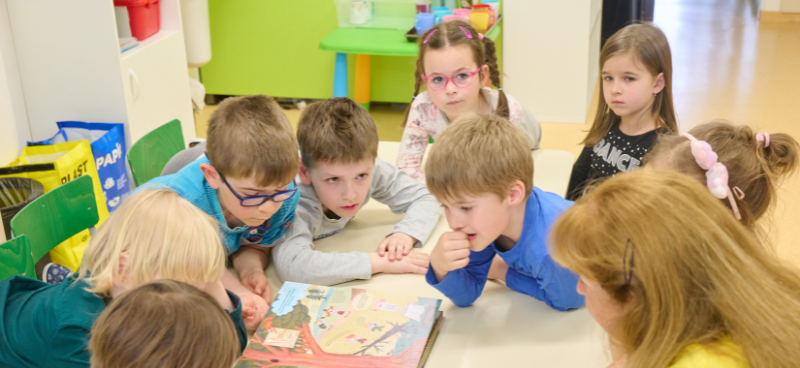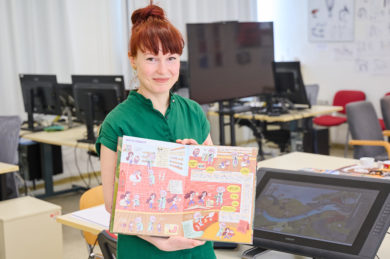
Don’t forget your feet. An original book for children was created on the premises of FMK
9. May 2023How the feet affect the behavior of the whole body, how they work, why they sometimes hurt, how to put on the right shoes and why you sometimes go barefoot. These and other questions are answered in a picture publication called Nezapomeň na nohohy. It is intended for children and their parents, but also for kindergarten and elementary school teachers.
A richly illustrated book with practical advice and examples of how to take care of your feet properly was created at the Department of Marketing Communications and the Animation Studio of our faculty in cooperation with the Technology Transfer Center (CTT). It is divided into nine chapters that deal in detail with the issue of children’s feet.
“This book is educational, so it is assumed that an adult will work with the child. So it’s either a parent, or perhaps a kindergarten teacher, or the children get to know her in clubs or in first and second grade classes,” says Radomila Soukalová, one of the authors.
In addition, a detailed manual is prepared for each chapter for adults, who can study the issue and theory in advance before starting to work with the book itself and the children.
“The position of the feet and their proper functioning is extremely important, because how we stand and walk affects the position and functioning of the entire body. Improper use of the feet already in childhood, one-sided loads and inappropriate shoes can be the cause of a whole range of health problems in later years. The book is intended to be a guide and at the same time a prevention, so that children and their parents realize that the feet are the basis of our body, a pillar that needs to be well taken care of from an early age,” explains co-author Jana Vašková. “Children will learn in a playful way how to stand correctly, how to move correctly, and for example how to correctly do such a seemingly simple movement as a squat. Because even many adults do not master the technique of performing a squat, by doing it incorrectly they overload the knees and back, which is a frequent cause of pain, the development of arthrosis and various movement difficulties,” she adds.
Practical exercises are included
There is a QR code on each double page, under which children, together with their parents or teachers, can find animations and practical videos with exercises. According to them, they can then exercise together. Readers will learn how feet work, how to use them correctly, how to take care of them, how to perform a pedicure, or even why walking barefoot is healthy, where and how to walk barefoot, where not anymore and when it is better to wear shoes. A separate chapter is devoted to footwear, which describes what the right shoe should look like and, conversely, what footwear is not suitable for the feet. “All this is depicted in beautiful pictures. We also introduce readers to the risks of diseases that can affect the feet when we use them incorrectly or wear inappropriate shoes. It is important to remember that every foot is individual and not every shoe is suitable for it. Even the best shoe on the wrong foot is a bad shoe. In order to keep our feet healthy, we must not forget about regular exercise and exercise,” says Jana Vašková.
The illustrator of the book, Eliška Chytková from the Animated Creation studio, had a relatively free hand during her own creative work, but under the strict supervision of experts in the field of podiatry. “After so many consultations, I am sure that the drawn positions of the children and the accuracy of their movements are correct. As part of testing the book on the children in the family, it was gratifying to observe their interest in getting moving and exploring how their legs affect the functioning of the whole body,” she says.

Illustrator Eliška Chytková with the book Don’t Forget Your Feet
“Shoes are associated with humans almost from the first steps and accompany us throughout our lives. It is therefore an integral part of everyday life, and therefore it is necessary to pay great care to this area. Functionality and comfort are the most important factors in footwear, which undoubtedly contribute to healthy foot development in the young population. I perceive the book Nezapomeň na nogy, its content and balanced content as very beneficial from the point of view of familiarizing and educating the young generation with this issue. In terms of content, it appropriately complements and follows on from the activities of the Footwear Research Center,” says Tomáš Sáha, director of the Footwear Research Center at TUB.
The book will be published by the publishing house Host
The authors of the book managed to find a publisher, with whom a license agreement was subsequently signed thanks to the Technology Transfer Center of the Tomáš Bata University in Zlín. The book will be published by Host publishing house on May 18, 2023. The book was also created thanks to the support of the Technological Agency of the Czech Republic (TAČR). “It is exactly the good example of transferring knowledge into practice. And the fact that we finally managed to sign the license agreement and publish the book makes us very happy,” said Ivana Bartoníková, director of the UTB Technology Transfer Center in Zlín. “In addition, the prototype of the book is protected by an industrial design,” added Přemysl Strážnický, CTT specialist.

The book is complemented by a game pack.
But the focus on children’s feet does not end with this book. This is followed by a board game with the same name, which thematically follows the book. It is a board game with cards where the exercises are illustrated just like in the book. “Some of the same, some new, the board game is again for preschoolers and kindergarteners year old. Children will use the knowledge from the book, the figures and characters they know from the book are included. The game is supplemented by a mobile game where all the characters from the book appear again,” concludes Radomila Soukalová.